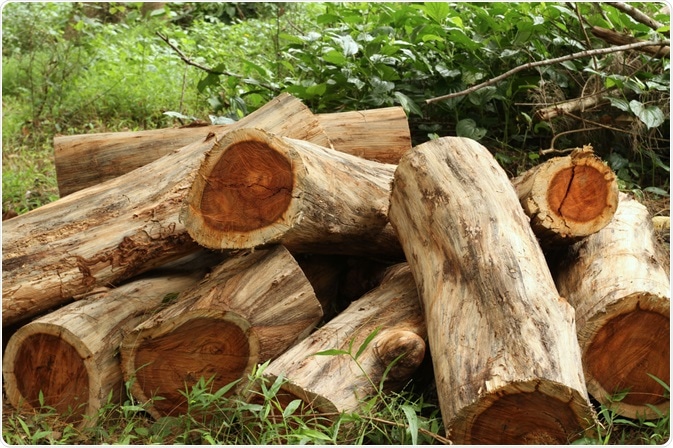Rosewood is one of the most exploited species of trees around the world, as it is used in making luxurious furniture, musical instruments, as well as producing rosewood oil, bringing its species to the brink of extinction. This scarcity of rosewood resources has led to prices rise, with no signs of slowing down.

Image Credit: Winai Tepsuttinum/Shutterstock.com
Costs exceeding $17,000 per ton
Rosewood grows in tropical regions of the world, and the name encompasses several dark-red hardwood species of tree. The wood harvested from these types of trees is valued for its characteristics of being strong, heavy, and aesthetically pleasing, which has led to it being in high demand for creating furniture and musical instruments.
The trees are also exploited to produce rosewood oil, which is used for its supposed analgesic, antidepressant, antiseptic, aphrodisiac, antibacterial, and cephalic properties. Because of its popularity, rosewood trees have been heavily harvested, resulting in all kinds of rosewood species becoming increasingly scarce.
This high demand for the wood, coupled with its growing rarity has resulted in prices soaring, with them exceeding $17,000 per ton a few years ago, which is ten times the cost of other tropical hardwood species. Thai rosewood, in particular, can reach values exceeding $50,000 per cubic meter.
Rising demand from China
The major source of the rising demand for rosewood is coming from China. Here, there is an insatiable call for the resource, mostly to produce hongmu (antique furniture). Because historically hongmu was used by the imperial elite of China’s society, it has become synonymous with class, wealth, and success.
In modern China, hongmu is highly coveted by the rising middle class, leading to an ever-rising demand for imports of rosewood. A 40% increase in demand for rosewood has been attributed to the increasing interest of the Chinese middle class to own rosewood furniture. This increase in demand is associated with a 15-40% rise in rosewood costs over the last few years.
As rosewood populations have decreased in the regions of Latin America and South-East Asia due to the desire to meet these high demands, Africa has been left as the major supplier of rosewood.
Zambia has emerged as one of China’s major sources for this prestigious wood. Ghana is also an important producer, with 96% of all its rosewood lumber being exported to meet China’s needs.
Unfortunately, rosewood harvesting in Africa is often not done sustainably. Because of this, populations have begun to dwindle, which resulted in multiple species being put under the protection of the Convention on Trade in Endangered Species. This decrease in trees has also led to an uptick in rosewood prices. The rarer the trees become, the more producers can charge for the commodity.
In China, consumers are willing to pay these rising prices because it is accepted to be an expensive commodity.
In both Zambia and Ghana, illegal harvesting and trade of rosewood take place. In addition, sustainable forest management plans on the regulation of rosewood are often not observed or monitored due to corruption. In Zambia, this has resulted in little economic benefit being bestowed to the country thanks to the rosewood trade.
It is estimated that the Zambian government is losing around $3.2 million in potential revenue annually. Because of this, the forests are becoming depleted without the appropriate funds or systems to monitor and replenish them. This is adding to the scarcity of the trees, which is further boosting its cost.
Bloodwood: Rosewood Trafficking Is Destroying This National Park | National Geographic
Protecting rosewood
To combat the detrimental impact of the rosewood trade, several key rosewood producing regions are campaigning for better protection of the species. In Thailand, in 2013, legislation was passed to protect rosewood under international law. This was brought in to help fight the loss of the population to export, predominantly to China.
While the trees were already protected there, the laws had been weakly enforced. The newer legislation means that the trees are now protected under the Convention on International Trade in Endangered Species, which regulates them as a threatened species that require logging permits and must not exceed set quotas.
Before this legislation passed, the country had seen a 66% reduction in trees over just five years. While laws will help to protect the rosewood species, it is unlikely that the enhanced regulation of the product will help to lower prices.
Due to the ever-increasing popularity of the wood, it is unlikely that regulation to regrow populations will significantly impact the value attributed to the scarcity of the product for at least the next few years.
Further Reading
Last Updated: Jan 21, 2021